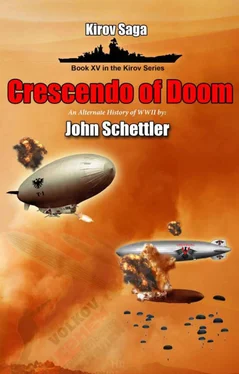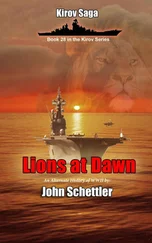“Thunderheads ahead sir,” said his navigator. “Shall we steer to avoid them?
“Steer directly for them,” Karpov intervened. “Take us right into the heart of the storm. Find the worst air possible. If you see lightning, steer directly for it. Yes, I know this is dangerous, but we survived a storm like this easily enough over the English Channel, and we can ride this one out as well.
“Aye, sir, but why would we want to do this? Are you testing the integrity of our skeleton? Engineers tell me they have good solid welds on those damaged frame girders. There’s no need to air test. Why steer for the storm and put the ship at risk again?”
There, he had finally done it. Bogrov had directly asked the Admiral why he should carry out the orders he had received. He knew that was risky, always risky with a man of Karpov’s temperament. One could never predict how he would react, but Bogrov would go unsatisfied. Karpov merely looked at him, then stared quietly out the viewport at the rising wall of thunderheads. Bogrov watched as the Admiral slowly adjusted the fit of his black leather gloves, and he knew better than to say anything more.
Part II
Lightning in the Sky
“What tongue does the wind talk? What nationality is a storm? What country do rains come from? What color is lightning? Where does thunder go when it dies?”
―Ray Bradbury
Raqqahon the upper Euphrates was the ancient capital of the old Abbasid Caliphate dating from the year 796. Centuries earlier it was known as Leontopolis under the Greeks, the “City of Leon,” where emperor Leo I reigned. The Greeks and Romans came and went, ant then came the Muslim warlord Iyad ibn Ghanm, who took the city in 639, for there were already holy Muslim monasteries there, where companions of Muhammad himself once lived. At one time it was bigger than Damascus, the center of an empire that reached into Central Asia, and stretched all the way to the deserts of North Africa.
In modern times Raqqah was also the seat of the dark Islamic rose of power that the West came to call ISIS. First arising as a resistance movement against the Assad regime in a shadowy evolution of the “Arab Spring,” ISIS soon morphed into the most effective paramilitary Islamic militant group yet seen, sweeping out of their strongholds in northern Syria and into Iraq, where the thin national boundary drawn by the post WWI Sykes–Picot Agreement was declared null and void, and a new modern Caliphate was pronounced. Utilizing brutal terror tactics that were flashed across the world’s computer screens on the Internet, ISIS soon drew a hard response from the U.S., and flurries of ship fired Tomahawk cruise missiles found targets in and around the city.
In 1941, the only cruise missiles in the world were still aboard the battlecruiser Kirov , a strange new mercenary for another empire that was trying to claim the place as its own. British and commonwealth troops were striving to bring the once great domain of the Abbasid regime under the authority of the Crown, but here there enemies would not be the dashing Sindi horsemen of the 9th Century, nor the swarthy, armored Azarbayjani infantry beneath their black banners. Instead they would be facing the tough, battle tested troops of Fallschirmjäger Sturm-Regiment 1, commanded by Oberst Hermann-Bernhard Ramcke.
He was a short, cheeky, round faced man, eyes alight when he smiled. A newcomer to the Luftwaffe, he had first entered military service through the navy as a ship’s boy in 1905. Ramcke also fought with German Marine-Infanterie near Flanders in WWI, wounded five times. As if he could not get enough of the harsh cruelty of war, he joined Western troops attempting to interfere in the burgeoning Russian Revolution, fighting against Bolshevik forces led by Sergei Kirov in 1919. He had only just transferred to the Luftwaffe, less than a year ago in July of 1940, when Kurt Student picked him to join his 7th Flieger Division.
It was a fateful move for him, for he would later go on to command the elite 2nd Fallshirmjager Division in Italy and Russia, one of the toughest fighting German divisions of the war. He already had a taste of this new war in the lightning swift assaults that took both Malta and Cyprus from the British, and was now thinking Crete might be his next assignment when news came that his unit had been selected for a new deployment.
“The Führer has authorized increased German support for the Vichy French in Syria,” Student had told him. “The British have been busy putting down the rebellion of Rashid Ali and his so called Golden Square over in Iraq. To do this they moved considerable forces from India, at least two divisions. Now, with this big operation underway against Damascus and Beirut, they think they are going to swing up the Euphrates, take Aleppo, and cut the major rail links into Turkey. So your men will go here, to Dier Ez Zour.”
‘The entire regiment?” Ramcke thought it was a long way to move his troops on such short notice. “We are still consolidating on Cyprus at Nikosia.”
“Don’t worry about that. What’s left of the Cypriot resistance has fled to the highlands. I will dispatch a battalion to see about them. Pull together your recon battalion, and a company of engineers. That is all you need take. Von Sponek already has the 65th Airlanding Regiment south of the river. You will land to the north. There is a road there that extends up to Mosul, and the British may come from that direction. They must not be allowed to move up the river further towards Raqqa, or to cross the river to attack Dier Ez Zour. Things did not go so well for the 65th in Holland, so put some backbone in the men. If necessary, blow the bridge over the Euphrates.”
It had been necessary.
Within hours of his arrival on the scene north of Dier Ez Zour, Ramcke learned that the British were, indeed, pushing two columns toward the city. One advanced directly up the Euphrates, and the 65th Regiment was soon engaged so heavily that its commander was killed, leaving Ramcke as the senior officer on site. Yet he realized he was on the wrong side of the river. So he made the decision to take his troops south of the Euphrates and have his engineers demolish the bridge. Then word came that a third British column was now advancing on the town along the road to Palmyra, and Ramcke knew his forces would soon be badly outnumbered, and under attack from three quarters.
It was then that he received Von Sponek’s orders to withdraw to Raqqah. “Use any vehicle you can get your hands on,” he told him on the radio. “But get your men north as soon as possible. There are British commandos at Raqqah! Take the place and hold it.”
The transport available was fairly lean, but given casualties sustained against the British 10th Indian Division, they had collected enough trucks to move most of the men. For those that had no vehicles, a special night operation was mounted by landing nine JU-52s on the desert roads north of the town, as the airfield was now under British artillery fire. It was a daring operation, but “Auntie Ju” would not fail her men that day, and the nine planes all got safely away, including Ramcke and most of his Recon Battalion.
The last troops to leave the position at Dier Ez Zour, he would be the first to arrive up north that night at Raqqah. Word had come that British commandos were already at the airfield, so the JU-52s that carried them also stored fresh parachutes for the men.
“Well, this is a real bitter cup of tea,” said Ramcke to Oberleutnant Adolf Feldmann, a special agent of the Abwehr attached to his unit. He had been in Iraq, trying to organize resistance against the British in coordination with the Brandenburgers, and he had a troop of twenty of those elite commandos with him when he arrived at Dier Ez Zour to join the Germans there.
Читать дальше












